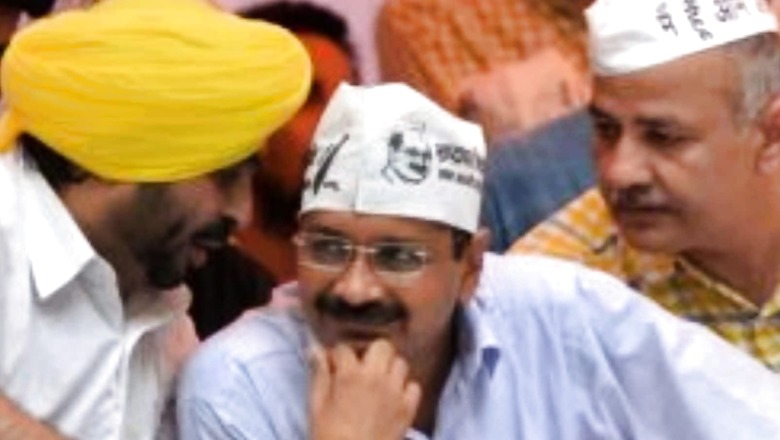
views
“We have changed Delhi…I have a pact with God that I will not die before seeing my country as the number one in the world,” Delhi Chief Minister Arvind Kejriwal announced at a farmers’ ‘mahapanchayat’ in Haryana’s Jind on April 4, 2021.
Kejriwal urged the farmers, who have been demanding the repeal of three central laws, to stick to the fight “till the end” and assured his audience that he is the same person “from 10 years ago” — an unmistakable reference to his anti-corruption agenda that catapulted him to political prominence.
He detailed the steps he had taken for the farmers who have been camping at key entry points to Delhi since November-end, such as opening ‘langars’, providing water tankers and building toilets.
“We have paid a huge price; they (the BJP-led central government) are punishing us for supporting the farmers’ agitation. They have passed a law that inside Delhi, the elected government, the elected chief minister will have no powers, all powers are with the LG (lieutenant governor). Is this the reason why struggle for freedom was waged?” he said, referring to the Government of NCT of Delhi (Amendment) Act, 2021 that gives primacy to the LG, who reports to the Union home ministry.
In short, Kejriwal toed the line that he has been following: he took on then Centre’s ruling Bharatiya Janata Party (BJP), accused it of posing hurdles for his government and backed the ongoing farmers’ protest.
And then – perhaps most significantly – Kejriwal presented himself as a ‘deshbhakt’ (patriot), a strategy that experts say has been copied from the BJP’s playbook to launch an assault on it.
“The one who is with the farmers’ agitation is a patriot, the one who is against the farmers’ agitation is a traitor,” Kejriwal said at the rally.
Kejriwal positioning himself as a ‘deshbhakt’ comes in the backdrop of his nine-year-old Aam Aadmi Party (AAP) hinting at its national ambitions.
In the AAP’s national council meeting in January, Kejriwal had announced that his party would contest polls in six states — Punjab, Uttar Pradesh, Uttarakhand, Goa, Himachal Pradesh and Gujarat, where elections are due next year. Over the past few months, his visits to these states is ample demonstration of Kejriwal’s renewed push to go national.
And ‘deshbhakti’ is the first keyword that the AAP thinks will help it realise its ambitions.
So much so that on the eve of India’s 75th Independence Day this August 15, Kejriwal announced that his government would introduce a ‘deshbhakti’ curriculum in Delhi schools.
The curriculum, Kejriwal said, is aimed at achieving three goals: children must feel pride for the nation, they should be aware of their responsibilities and duties towards the country, and they should be prepared for sacrifice to find solutions to India’s problems.
And now, the AAP has announced ‘Tiranga yatras’ in every assembly constituency in the politically crucial Uttar Pradesh. The first in the series was held in Agra on Sunday. The one in Ayodhya will be held on September 14.
That’s not all. If ‘deshbhakti’ is the first pillar of the AAP’s new strategy, the other – and arguably more significant – has to be ‘Ram rajya’. These are the two ideas that the party appears to be harping on, alongside the ‘Kejriwal model of development’ that focuses on free services such as water and electricity, free Wi-Fi, free bus rides for women and better schools and hospitals, among others.
Kejriwal, in the budget session of the Delhi assembly in March, spoke of establishing a ‘Ram rajya’, even as he assured senior citizens of free pilgrimage to the Ram temple in Ayodhya, which is under construction.
Senior journalist Neerja Choudhury said Kejriwal is using the politically sensitive term to appeal to “the constituency represented by the BJP”. Opposition parties, which have been pushed to the corner, are trying to find their way out with the BJP dominating the political space, she added.
Kejriwal has not said anything anti-Muslim, but his focus on ‘Ram rajya’ could spark suspicions, Choudhury said. But that could be the risk the AAP seems to be willing to take, she added.
In the Delhi assembly, Kejriwal had said he is a devotee of Lord Ram and Lord Hanuman and stressed 10 principles that would be the guiding principles of a ‘Ram rajya’ in Delhi. These principles were: freedom from hunger, quality education for children, best medical treatment for all, 200 units of free electricity for all, 20,000 litres of free water for each household, employment for all, housing for the poor, women’s security, respect for elders, and equality among all castes and religions.
In a way, he emphasised that the notion that ‘Ram rajya’ will mean good governance and better living standards for all, and hinted that it won’t be exclusionary or discriminatory.
But Choudhury said ‘Ram rajya’ acquires a certain meaning in today’s context. “And that is where the question begins: how do they (opposition parties) identify with Hindus, their concerns and what they feel is their identity… and yet not be against other communities? That is a tight rope walk.” Choudhury said.
Political analyst Geeta Bhatt said the concept of ‘Ram rajya’, in this instance, is based on “moral authority (naitikta)”. “Now, that morality comes under question because he (Kejriwal) is talking in actual sense with respect to Ram rajya, especially when he said he will sponsor the elderly to visit the Ram temple once it has been built.”
The reason, she argued, is that Kejriwal has not demonstrated his commitment towards the building of the Ram temple. “Of course that is personal and (donation) amount is not important…(but) it is the thought, it is the commitment to the construction of the Ram temple that matters,” she said.
Bhatt also questioned Kejriwal’s pledge of establishing a ‘Ram rajya’ in Delhi. “The kind of crisis which we have seen in Delhi both waves of Covid…he has been reprimanded even by courts,” Bhatt said, pointing out that a ‘Ram rajya’ would mean people living in peace with access to all amenities.
Nevertheless, the AAP seems to have zeroed in on its strategy to gain national foothold – something it has aspired for but has not been able to achieve so far. It would hope that ‘deshbhakti’ and ‘Ram rajya’ would go on to become trump cards that would turn the tide in its favour as far as national politics is concerned. Most importantly, it would hope that its new buzzwords would strike a chord with Hindus, and its welfare schemes and message of inclusiveness would appeal to all, including minorities. Achieving that balance would be challenging and only time will tell how Kejriwal and his AAP would fare.
Read all the Latest News, Breaking News and Assembly Elections Live Updates here.

















Comments
0 comment